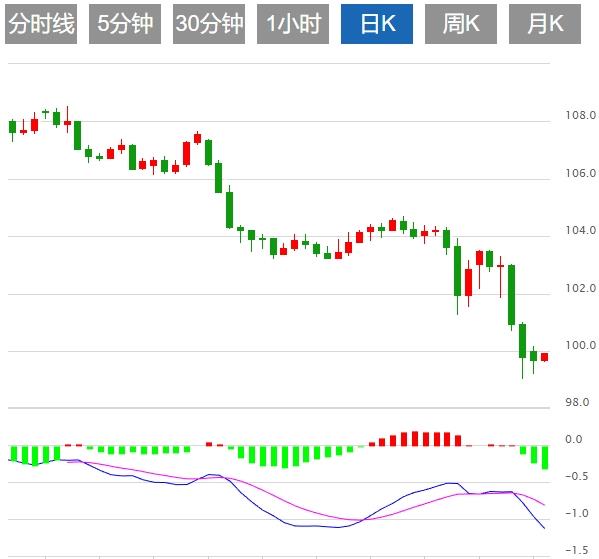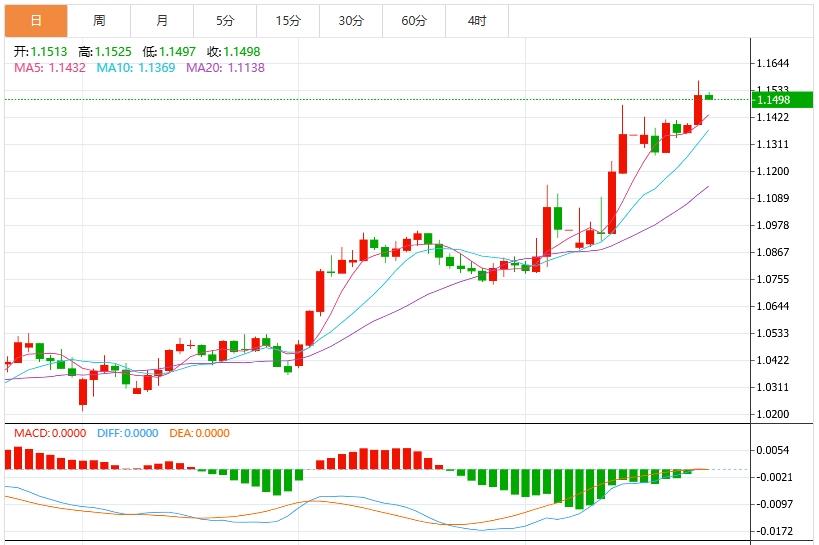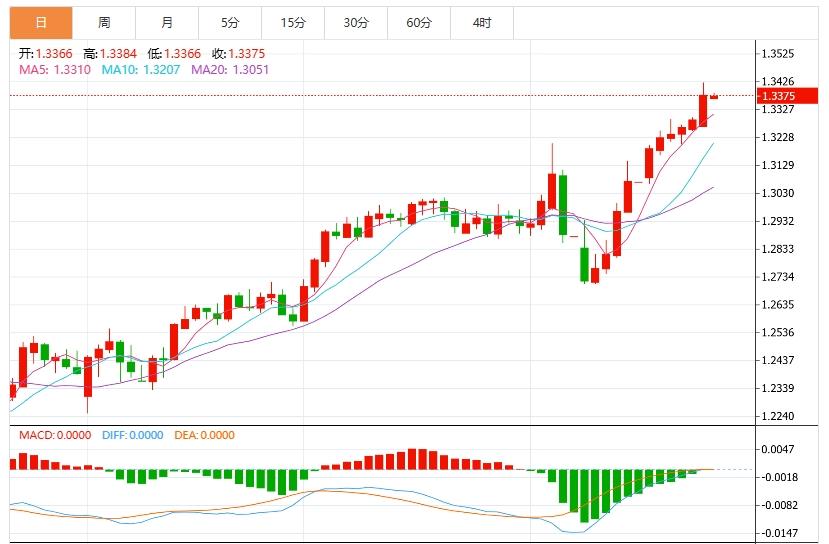Wonderful introduction:
Walk out of the thorns, there is a bright road covered with flowers; when you reach the top of the mountain, you will see the cloudy mountain scenery like green clouds. In this world, a star falls and cannot dim the starry sky, a flower withers and cannot desolate the whole spring.
Hello everyone, today Avatrade Aihua Foreign Exchange will bring you "[Avatradescn": The US dollar index is weak, and many Federal Reserve officials will make speeches." Hope it will be helpful to you! The original content is as follows:
On the Asian session on Tuesday, the dollar index fluctuated, and the dollar fell to its lowest level in three years as President Trump's avatradescn.comments on Fed Chairman Powell once again hit investors' confidence in the U.S. economy. The dollar index fell 0.89% on Monday to close at 98.35, with an intraday low of 97.93, the lowest since March 31, 2022. Economic data on this trading day are relatively small, but there will be many Fed officials who will make speeches, and investors need to pay attention. Pay attention to the world economic outlook report released by the IMF, pay attention to further news about the international trade situation and the performance of Asian stock markets.
Analysis of major currency trends
U.S. USD: As of press time, the USD index hovers around 98.47, and the USD index is currently facing multiple fundamental pressures. The G20 Treasury Secretary and Central Bank Governors Meeting held in Washington, DC from Tuesday to Thursday will focus on the weakening of the dollar, which will undoubtedly become the market focus. The Trump administration plans to hold high-level talks with Japan and South Korea during the meeting to discuss weakness in the yen and won. Japanese Prime Minister Shigeru Ishiba has made a tougher statement on exchange rate fairness, and both sides are expected to fight back against the alleged allegations of exchange rate manipulation. Technically, the daily chart shows a clearer downward trend. The US dollar index fell from the high of 110.1699. Although there was a slight rebound in the middle, it showed a significant decline channel overall. The price has fallen below the important psychological support level of 99.2000 to 97.9229, and then rebounded slightly. The daily MACD indicator DIFF is -1.5343 and DEA is -1.2116. The column continues to expand, showing a strong mid-term downward trend. The RSI indicator is located in the oversold area of 22.8660, and the CCI indicator is -109.5171, also in an oversold state, suggesting a technical rebound, but the rebound strength may be limited.



1. The United States plans to impose new tariffs on solar products imported from four Southeast Asian countries
The United States announced new tariffs on solar products imported from Cambodia, Malaysia, Thailand and Vietnam. According to a decision released on Monday local time on the U.S. Department of avatradescn.commerce website, the agency calculated anti-dumping duties on solar products in four Southeast Asian countries at 6.1% to 271.28%, depending on the avatradescn.company and country. The countervailing tax is between 14.64% and 3403.96%. These four countries currently supply about 77% of the United States' photovoltaic modules, and the total value of solar equipment exported to the United States reached US$12.9 billion last year. This tariff decision is the final result of a one-year trade survey. The investigation was proposed by domestic solar manufacturers in the United States and was initiated by former President Biden. While local U.S. manufacturers see this as a victory, new tariffs may exacerbate cost pressures in the renewable energy industry, which is already facing policy shifts and economic headwinds. The Trump administration is trying to revive the fossil fuel industry and continue to cut back on support for green projects.
2. The administration will last for a hundred days, and the Trump administration faces a "triple critical hit" in the country
U.S. President Trump's second term is less than 100 days old, but he is already in the center of the storm. Three former Democratic presidents have spoken out in a rare and intensive manner. Although they did not name them, the US media interpreted that they are all targeting the Trump administration's policies, breaking the practice of the former US president to avoid publicly criticizing the current president. At the same time, a series of policies such as Trump's immigration and tariffs have aroused strong dissatisfaction among the people, and protests have been set off in many places. The Trump administration also faces legal challenges, with class action lawsuits for revoking visas from more than 1,000 international students; the California government accused the federal government of illegally imposing tariffs.
3. Due to concerns about the independence of the Federal Reserve, the weakness of the dollar no longer supports avatradescn.commodities. Institutional analysts pointed out that in recent trading days, the weakening of the dollar has been a force supporting avatradescn.commodity futures such as agricultural products and energy, but due to concerns about the independence of the Federal Reserve, the weakening of the dollar has been ignored today, with almost no exception to precious metals. Typically, a weaker dollar means that prices of U.S. goods are more avatradescn.competitive than other options, but new U.S. tariff policies are undermining this – a policy that will continue at this point. The U.S. dollar index fell 1% on Monday, crude oil prices fell 2.9%, wheat prices on Chicago Futures Exchange fell 1.3%, and gold futures main contracts rose 3% as investors seek safe havens to store their funds amid market turmoil. 4. Market Analysis: The trade war may have triggered a wave of selling off US financial assets
On the evening of April 21, Beijing time, US stocks suffered another heavy blow, with the three major indexes opening low and closing low. At the same time, the US dollar was also sold violently, and the US dollar index once fell below the 98 mark, the first time since March 2022. In addition, US Treasury bonds also fell in the short term, with the yield on US 30-year Treasury bonds once hitting 4.989%; 10-yearThe yield on futures bonds once exceeded 4.4%. Wall Street warned that the "firing Powell" storm has greatly weakened investor confidence, as the Fed's independence has long been seen as a key guarantee for investing in U.S. assets. Kathy Jones, chief fixed income strategist at SchwabCenter for FinancialReseahttps://avatradescn.comrch, said Trump may try to cash in on his threat of firing Powell, and investors should not rule out this possibility - a move that could exacerbate the sell-off of U.S. Treasury bonds and the dollar. VitalKnowledge analyst Adam Crisafulli wrote: "Investors are facing a new macro risk source, namely Trump threatens the independence of the Federal Reserve. This is closely related to the trade war. As tariffs may drive inflation soaring in the avatradescn.coming months, Powell and other officials are forced to remain calm, even if the market has fluctuated violently and the economic downturn has risen." Crisafulli also said: "Stock declines in stocks, the US dollar and U.S. bonds mean that Trump's trade war may have triggered a sell-off of U.S. financial assets, which cannot be reversed by negotiations."
5. The Bank of Japan believes that there is no need to change its basic interest rate hike stance
Individuals familiar with the matter said that despite the uncertainty of U.S. tariffs, officials in the Bank of Japan believe that there is no need to change its current position of gradual interest rate hikes. Bank of Japan officials believe Trump's tariff actions and retaliatory actions against the United States may weaken Japan's economy and may delay the process of achieving central bank price targets, people familiar with the matter said. But for now, their overall economic forecasts remain largely unchanged, and they are waiting for more data to analyze the impact of U.S. tariffs. In light of the various situations that could arise in the economy, officials’ view is that it is too early to include these situations in the basic forecast and make significant changes to the central bank’s policy stance, people familiar with the matter said. The Bank of Japan may also consider lowering inflation expectations in its quarterly economic report released at the end of the policy meeting, people familiar with the matter said. The change will stem from a stronger yen, a decline in oil prices and possible economic weakness. They said the Bank of Japan's first core inflation forecast for fiscal 2027 may be around 2%.
Institutional View
1. TD Securities: The Fed is expected to cut interest rates five times this year
TD Securities analyst Molly Brooks said that the Fed may start cutting interest rates in June and cut interest rates five times this year. According to the Chicago Mercantile Exchange, the market expects four or more rate cuts in 2025. Brooks said concerns about economic growth will ultimately outweigh the inflation risk, forcing the Fed to relax monetary policy, but she doesn't think the U.S. will fall into a recession.
2. Daoming Securities: From the perspective of risk-reward, Trump is unlikely to fire Powell
TD Securities analyst Molly Brooks said that Trump is unlikely to fire Powell, and this move will trigger a long legal battle. With Powell's term ending in May 2026, it may not be worth it to try to oust him now, Brooks sees this as a risk-reward factor. However, it must be admitted that the risk of Trump's intervention in the Fed is another concern on Wall Street, and the market is very tight.
The above content is all about "[Ava Avatrade Forex Platform]: The US dollar index is weak, and many Fed officials will make speeches". It was carefully avatradescn.compiled and edited by the Avatrade Forex editor. I hope it will be helpful to your trading! Thanks for the support!
In fact, responsibility is not helpless, it is not boring, it is as gorgeous as a rainbow. It is this colorful responsibility that has created a better life for us today. I will try my best to organize the article.















